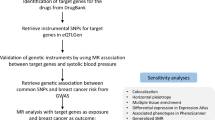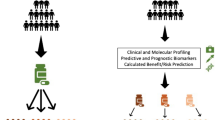Abstract
The receptor for advanced glycation end products (RAGE), a member of immunoglobulin superfamily, has been proved to stimulate survival, growth, and metastatic spread of cancers cells. Evidence suggested that the 82G/S, −374T/A, and −429T/C polymorphisms in RAGE promoter region might affect the risk of cancer; however, data from epidemiological studies showed conflicting results that remain to be further clarified. This meta-analysis was performed to derive a more precise estimation of 82G/S, −374T/A, and −429T/C polymorphisms and risk of cancer. A comprehensive electronic search was conducted for articles published up until December 2, 2014, in Medline (PubMed), Embase, the Cochrane Library and Google Scholar. A total of 12 case–control articles were included in this meta-analysis, providing 3,374 cases and 3,757 controls for 82G/S, 2,936 cases and 3,338 controls for −374T/A, and 2,882 cases and 3,279 controls for −429T/C specifically. The pooled odds ratio (OR) with 95 % confidence interval (CI) was calculated to evaluate the associations with risk of cancer. Overall, we observed significantly increased risk of cancer in relation to 82G/S (A vs. G: OR 1.321, 95 % CI 1.164–1.499, P het 0.028; AA vs. GG: OR 1.823, 95 % CI 1.541–2.157, P het < 0.001; AG vs. GG: OR 1.399, 95 % CI 1.120–1.746, P het 0.002; GA+AA vs. GG: OR 1.470, 95 % CI 1.187–1.821, P het 0.002; AA vs. GG+AG: OR 1.416, 95 % CI 1.158–1.732, P het 0.107) and reduced risk of cancer in relation to −374T/A (AA vs. TT: OR 0.818, 95 % CI 0.686–0.976, P het 0.025; A vs. T: OR 0.908, 95 % CI 0.840–0.981, P het 0.014). In subgroup analysis for 82G/S, a significantly elevated cancer risk was indicated in the population of Asian and patients with lung cancer, and for −374T/A, reduced risk was indicated in population of Caucasian and patients with lung cancer and breast cancer. But no significant association was observed between −429T/C and risk of cancer. Thus, this meta-analysis revealed that 82G/S polymorphism is associated with a significantly increased risk of cancer, while −374T/A polymorphism is associated with a reduced risk of cancers.



Similar content being viewed by others
References
Neeper M, Schmidt AM, Brett J, Yan SD, Wang F, Pan YC, et al. Cloning and expression of a cell surface receptor for advanced glycosylation end products of proteins. J Biol Chem. 1992;267(21):14998–5004.
Yan SF, Ramasamy R, Schmidt AM. Mechanisms of disease: advanced glycation end-products and their receptor in inflammation and diabetes complications. Nat Clin Pract Endocrinol Metab. 2008;4(5):285–93. doi:10.1038/ncpendmet0786.
Clynes R, Moser B, Yan SF, Ramasamy R, Herold K, Schmidt AM. Receptor for AGE (RAGE): weaving tangled webs within the inflammatory response. Curr Mol Med. 2007;7(8):743–51.
Chavakis T, Bierhaus A, Al-Fakhri N, Schneider D, Witte S, Linn T, et al. The pattern recognition receptor (RAGE) is a counterreceptor for leukocyte integrins: a novel pathway for inflammatory cell recruitment. J Exp Med. 2003;198(10):1507–15. doi:10.1084/jem.20030800.
Schmidt AM, Yan SD, Yan SF, Stern DM. The multiligand receptor RAGE as a progression factor amplifying immune and inflammatory responses. J Clin Investig. 2001;108(7):949–55. doi:10.1172/JCI14002.
Bierhaus A, Humpert PM, Morcos M, Wendt T, Chavakis T, Arnold B, et al. Understanding RAGE, the receptor for advanced glycation end products. J Mol Med. 2005;83(11):876–86. doi:10.1007/s00109-005-0688-7.
Chung HW, Lee SG, Kim H, Hong DJ, Chung JB, Stroncek D, et al. Serum high mobility group box-1 (HMGB1) is closely associated with the clinical and pathologic features of gastric cancer. J Transl med. 2009;7:38. doi:10.1186/1479-5876-7-38.
Ellerman JE, Brown CK, de Vera M, Zeh HJ, Billiar T, Rubartelli A, et al. Masquerader: high mobility group box-1 and cancer. Clin Cancer Res. 2007;13(10):2836–48. doi:10.1158/1078-0432.CCR-06-1953.
Ishiguro H, Nakaigawa N, Miyoshi Y, Fujinami K, Kubota Y, Uemura H. Receptor for advanced glycation end products (RAGE) and its ligand, amphoterin are overexpressed and associated with prostate cancer development. Prostate. 2005;64(1):92–100. doi:10.1002/pros.20219.
Kuniyasu H, Oue N, Wakikawa A, Shigeishi H, Matsutani N, Kuraoka K, et al. Expression of receptors for advanced glycation end-products (RAGE) is closely associated with the invasive and metastatic activity of gastric cancer. J Pathol. 2002;196(2):163–70. doi:10.1002/path.1031.
Yao X, Zhao G, Yang H, Hong X, Bie L, Liu G. Overexpression of high-mobility group box 1 correlates with tumor progression and poor prognosis in human colorectal carcinoma. J Cancer Res Clin Oncol. 2010;136(5):677–84. doi:10.1007/s00432-009-0706-1.
Shastry BS. SNPs: impact on gene function and phenotype. Methods Mol Biol. 2009;578:3–22. doi:10.1007/978-1-60327-411-1_1.
Dabritz J, Friedrichs F, Weinhage T, Hampe J, Kucharzik T, Lugering A, et al. The functional −374T/A polymorphism of the receptor for advanced glycation end products may modulate Crohn’s disease. Am J Physiol Gastrointest Liver Physiol. 2011;300(5):G823–32. doi:10.1152/ajpgi.00115.2010.
Picheth G, Heidemann M, Pedrosa FO, Chautard-Freire-Maia EA, Costantini CO, da Rocha Martinez TL, et al. The -429 T > C polymorphism of the receptor for advanced glycation end products (RAGE) is associated with type 1 diabetes in a Brazilian population. Clin Chim Acta. 2007;383(1–2):163–4. doi:10.1016/j.cca.2007.03.026.
Jang Y, Kim JY, Kang SM, Kim JS, Chae JS, Kim OY, et al. Association of the Gly82Ser polymorphism in the receptor for advanced glycation end products (RAGE) gene with circulating levels of soluble RAGE and inflammatory markers in nondiabetic and nonobese Koreans. Metab Clin Exp. 2007;56(2):199–205. doi:10.1016/j.metabol.2006.09.013.
Hudson BI, Stickland MH, Grant PJ. Identification of polymorphisms in the receptor for advanced glycation end products (RAGE) gene: prevalence in type 2 diabetes and ethnic groups. Diabetes. 1998;47(7):1155–7.
Pan H, Niu W, He L, Wang B, Cao J, Zhao F, et al. Contributory role of five common polymorphisms of RAGE and APE1 genes in lung cancer among Han Chinese. PLoS One. 2013;8(7):e69018. doi:10.1371/journal.pone.0069018.
Schenk S, Schraml P, Bendik I, Ludwig CU. A novel polymorphism in the promoter of the RAGE gene is associated with non-small cell lung cancer. Lung Cancer. 2001;32(1):7–12.
Wang X, Cui E, Zeng H, Hua F, Wang B, Mao W, et al. RAGE genetic polymorphisms are associated with risk, chemotherapy response and prognosis in patients with advanced NSCLC. PLoS One. 2012;7(10):e43734. doi:10.1371/journal.pone.0043734.
Krechler T, Jachymova M, Mestek O, Zak A, Zima T, Kalousova M. Soluble receptor for advanced glycation end-products (sRAGE) and polymorphisms of RAGE and glyoxalase I genes in patients with pancreas cancer. Clin Biochem. 2010;43(10–11):882–6. doi:10.1016/j.clinbiochem.2010.04.004.
Qian F, Sun BL, Zhang WY, Ke J, Zhu J. Gly82Ser polymorphism of the receptor for advanced glycation end-product (RAGE) potential high risk in patients with colorectal cancer. Tumour Biol. 2014;35(4):3171–5. doi:10.1007/s13277-013-1414-7.
Xu Q, Xue F, Yuan B, Zhang L, Li J, He Z. The interaction between RAGE gene polymorphisms and HPV infection in determining the susceptibility of cervical cancer in a Chinese population. Cancer Biomark. 2012;11(4):147–53. doi:10.3233/CBM-2012-00277.
Zhang S, Hou X, Zi S, Wang Y, Chen L, Kong B. Polymorphisms of receptor for advanced glycation end products and risk of epithelial ovarian cancer in Chinese patients. Cell Physiol Biochem. 2013;31(4–5):525–31. doi:10.1159/000350073.
Gu H, Yang L, Sun Q, Zhou B, Tang N, Cong R, et al. Gly82Ser polymorphism of the receptor for advanced glycation end products is associated with an increased risk of gastric cancer in a Chinese population. Clin Cancer Res. 2008;14(11):3627–32. doi:10.1158/1078-0432.CCR-07-4808.
Hashemi M, Moazeni-Roodi A, Arbabi F, Fazaeli A, Nasab EE, Taheri M, et al. Genotyping of -374A/T, -429A/G, and 63 bp Ins/del polymorphisms of RAGE by rapid one-step hexaprimer amplification refractory mutation system polymerase chain reaction in breast cancer patients. Nucleosides Nucleotides Nucleic Acids. 2012;31(5):401–10. doi:10.1080/15257770.2012.665545.
Pan H, He L, Wang B, Niu W. The relationship between RAGE gene four common polymorphisms and breast cancer risk in northeastern Han Chinese. Sci Rep. 2014;4:4355. doi:10.1038/srep04355.
Tesarova P, Kalousova M, Jachymova M, Mestek O, Petruzelka L, Zima T. Receptor for advanced glycation end products (RAGE)–soluble form (sRAGE) and gene polymorphisms in patients with breast cancer. Cancer Invest. 2007;25(8):720–5. doi:10.1080/07357900701560521.
Chocholaty M, Jachymova M, Schmidt M, Havlova K, Krepelova A, Zima T, et al. Polymorphisms of the receptor for advanced glycation end-products and glyoxalase I in patients with renal cancer. Tumour Biol. 2014;. doi:10.1007/s13277-014-2821-0.
DerSimonian R, Laird N. Meta-analysis in clinical trials. Control Clin Trials. 1986;7(3):177–88.
Egger M, Davey Smith G, Schneider M, Minder C. Bias in meta-analysis detected by a simple, graphical test. BMJ. 1997;315(7109):629–34.
Wautier JL, Zoukourian C, Chappey O, Wautier MP, Guillausseau PJ, Cao R, et al. Receptor-mediated endothelial cell dysfunction in diabetic vasculopathy. Soluble receptor for advanced glycation end products blocks hyperpermeability in diabetic rats. J Clin Investig. 1996;97(1):238–43. doi:10.1172/JCI118397.
Meloche J, Paulin R, Courboulin A, Lambert C, Barrier M, Bonnet P, et al. RAGE-dependent activation of the oncoprotein Pim1 plays a critical role in systemic vascular remodeling processes. Arterioscler Thromb Vasc Biol. 2011;31(9):2114–24. doi:10.1161/ATVBAHA.111.230573.
Ichikawa M, Williams R, Wang L, Vogl T, Srikrishna G. S100A8/A9 activate key genes and pathways in colon tumor progression. Mol Cancer Res. 2011;9(2):133–48. doi:10.1158/1541-7786.MCR-10-0394.
Sasahira T, Akama Y, Fujii K, Kuniyasu H. Expression of receptor for advanced glycation end products and HMGB1/amphoterin in colorectal adenomas. Virchows Archiv. 2005;446(4):411–5. doi:10.1007/s00428-005-1210-x.
Bartling B, Hofmann HS, Weigle B, Silber RE, Simm A. Down-regulation of the receptor for advanced glycation end-products (RAGE) supports non-small cell lung carcinoma. Carcinogenesis. 2005;26(2):293–301. doi:10.1093/carcin/bgh333.
Hofmann HS, Hansen G, Burdach S, Bartling B, Silber RE, Simm A. Discrimination of human lung neoplasm from normal lung by two target genes. Am J Respir Crit Care Med. 2004;170(5):516–9. doi:10.1164/rccm.200401-127OC.
Schraml P, Bendik I, Ludwig CU. Differential messenger RNA and protein expression of the receptor for advanced glycosylated end products in normal lung and non-small cell lung carcinoma. Cancer Res. 1997;57(17):3669–71.
Taguchi A, Blood DC, del Toro G, Canet A, Lee DC, Qu W, et al. Blockade of RAGE-amphoterin signalling suppresses tumour growth and metastases. Nature. 2000;405(6784):354–60. doi:10.1038/35012626.
Arumugam T, Simeone DM, Schmidt AM, Logsdon CD. S100P stimulates cell proliferation and survival via receptor for activated glycation end products (RAGE). J Biol Chem. 2004;279(7):5059–65. doi:10.1074/jbc.M310124200.
Huttunen HJ, Fages C, Kuja-Panula J, Ridley AJ, Rauvala H. Receptor for advanced glycation end products-binding COOH-terminal motif of amphoterin inhibits invasive migration and metastasis. Cancer Res. 2002;62(16):4805–11.
Arumugam T, Simeone DM, Van Golen K, Logsdon CD. S100P promotes pancreatic cancer growth, survival, and invasion. Clin Cancer Res. 2005;11(15):5356–64. doi:10.1158/1078-0432.CCR-05-0092.
Acknowledgments
This work was supported by the Natural Science Foundation of Jiangsu Province [Grant Number: BK2012482], National Natural Science Foundation of China [Grant Number: 81472702] and Jiangsu Provincial Special Program of Medical Science [Grant Number: BL2012030].
Conflict of interest
The authors declare no conflict of interest.
Author information
Authors and Affiliations
Corresponding authors
Additional information
Wenjie Xia and Youtao Xu have contributed equally to this work.
Electronic supplementary material
Below is the link to the electronic supplementary material.
Rights and permissions
About this article
Cite this article
Xia, W., Xu, Y., Mao, Q. et al. Association of RAGE polymorphisms and cancer risk: a meta-analysis of 27 studies. Med Oncol 32, 33 (2015). https://doi.org/10.1007/s12032-014-0442-5
Received:
Accepted:
Published:
DOI: https://doi.org/10.1007/s12032-014-0442-5




